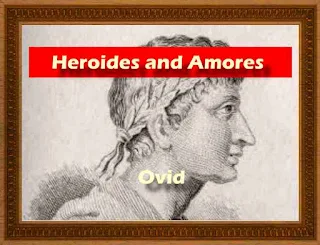Heroides and Amores
Publius Ovidius Naso was born at Sulmo, a city about ninety miles south-east of Rome, in the country of the Paeligni, on March 20, 43 B.C., the year of the second triumvirate, composed of Augustus, Antony, and Lepidus, and the year of the proscription and death of the Ciceros.
His family had been of equestrian rank for several generations. Ovid's education was begun at Sulmo and was completed at Rome and Athens. In deference to his father's wishes, he pursued, with his brother, the rhetorical studies usual with the ambitious young men of the time, expecting to enter upon a public career; but so fervent was his passion for literature, and so irresistible his instinct for literary art — he himself says that whatever he attempted to write took the form of verse — that he found it impossible to follow the profession of his father's preference.
He held, indeed, one or two minor offices in the public service, but his chief interests were always among the social and literary circles of the capital. Among those with whom he was intimate were Tibullus, who died when Ovid was twenty-four, Propertius, and Aemilius Macer of Verona. Horace and Virgil were his seniors by twenty-two and twenty-seven years respectively; he heard the former recite, and says he merely saw Virgil and was probably well acquainted with neither.
At the age of nineteen, Ovid mourned the death of his only brother. The poet was three times married — twice with divorce as a hasty result, and the third time to a lady of one of the oldest and most respected families of Rome, the Fabii. The last union seems to have been based upon serious affection, or, at least, esteem and remained un- broken to Ovid's death. A daughter, Perilla, is said to have been born of this marriage.
In 8 a.d., the poet was suddenly banished by Augustus — without loss of property or citizenship, however — to Tomi, a distant town on the Black Sea, where he dragged out a miserable, though poetically production, existence until his death in the year 18 at the age of sixty-one.
The cause of his banishment is generally supposed to have had some connection with the scandalous conduct of the Emperor's granddaughter Julia. Ovid's literary activities began at about his twentieth year and extended over a period of nearly forty years. His works fall naturally into three groups: the amatory poems, consisting of the Amoves, the Heroides, De Medicaviine Faciei, Ars Amatoria, and Remedia Amoris, were the works of his youth; in the following period appeared two poems, the Fasti and the Metamorphoses, which may be described as mythological; and the final products of his pen, the Tristia and the Epistulae ex Panto, came from Tomi, and were in the nature of laments. \
All of these poems have been preserved. The Medea, a Gigantoinachy, a Panegyric of Augustus after his death, a Parody on Bad Authors, and a poem in the language of the Getae, may be mentioned among works that have been lost.
Though composed after the Amoves, the Heroides are placed first in this volume because the Amoves in their extant form were the result of a revision by the poet, who first published them in five books. The present tendency may be said to favour the assumption that the last six of the Heroides, in spite of suspicious irregularities in form and language, represent a reawakening of the poet's interest in this field at a period later than the appearance of the first fifteen — possibly during or shortly after his composition of the Metamorphoses.
Download Heroides and Amores - 16.6 MB

